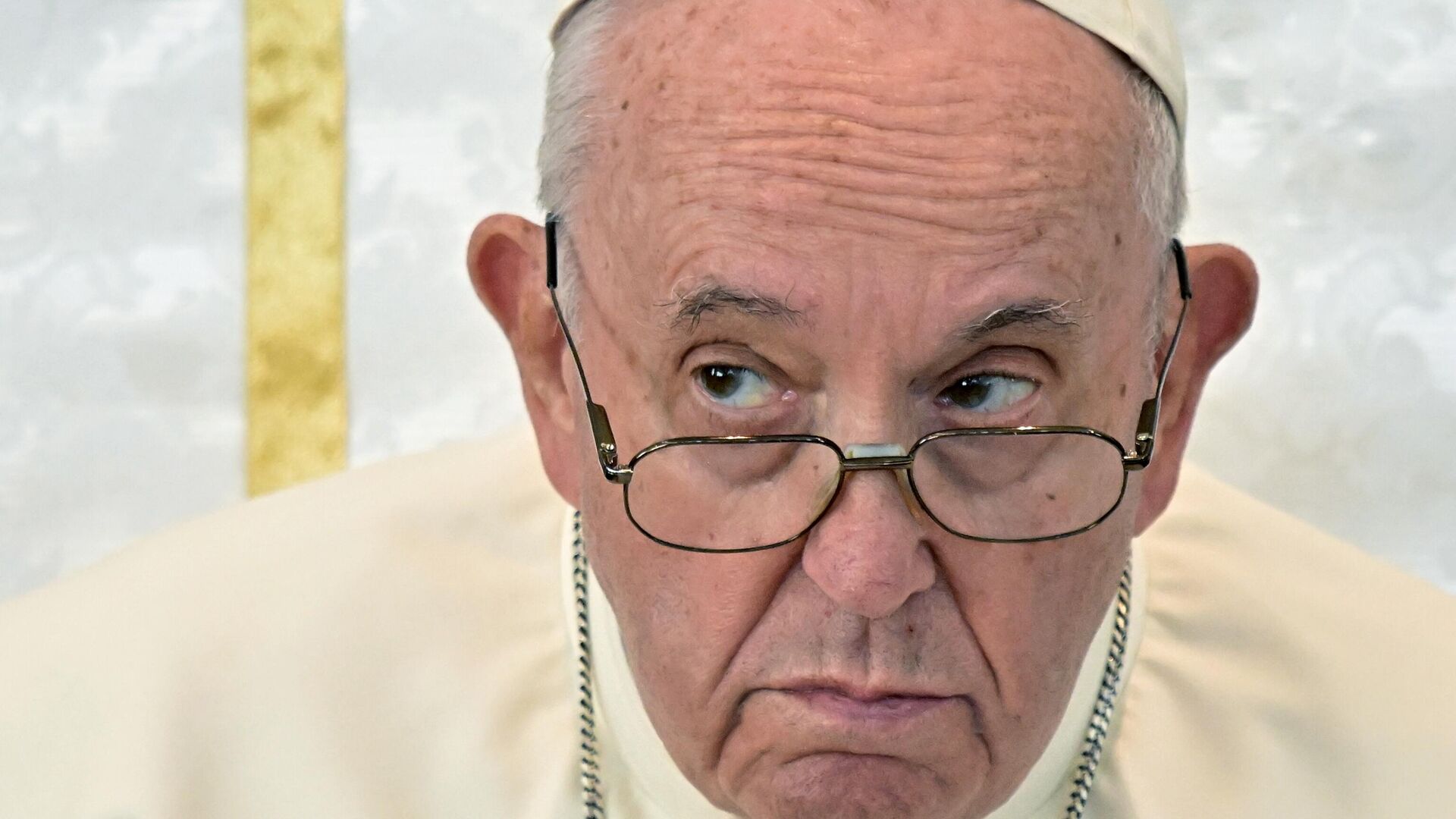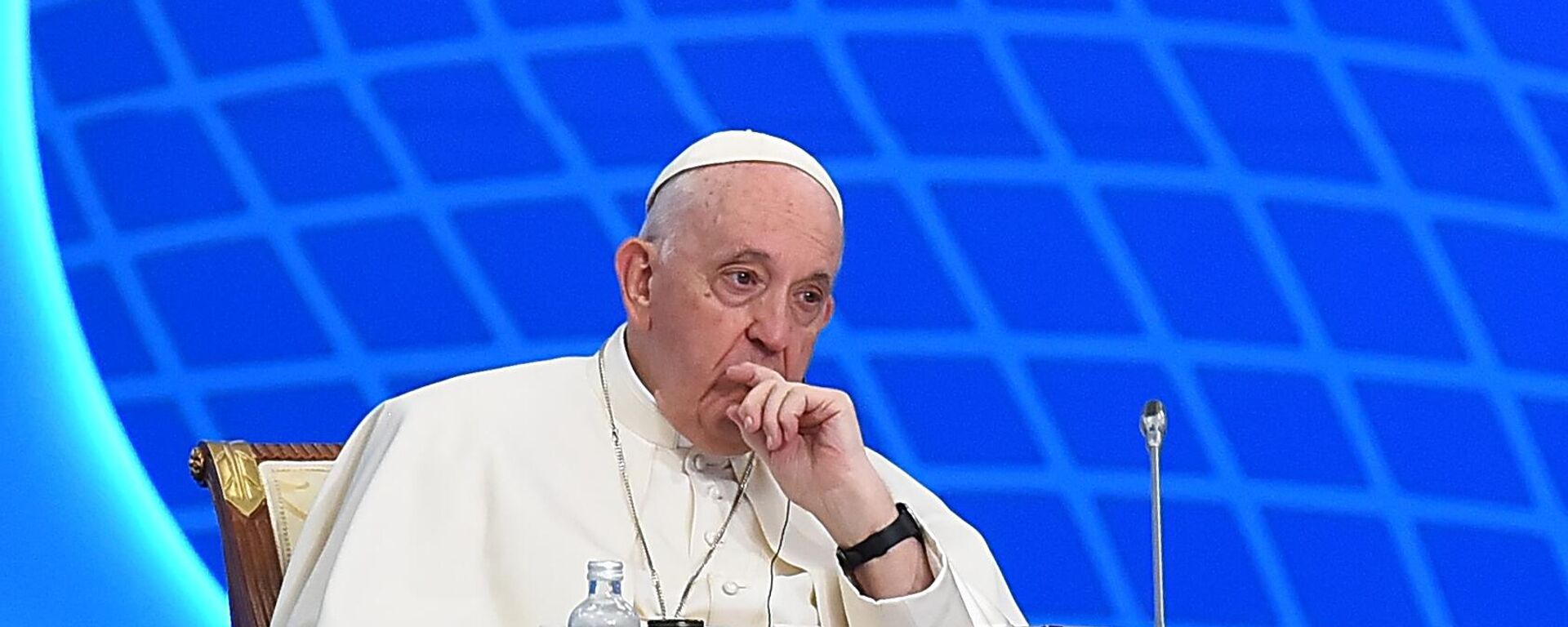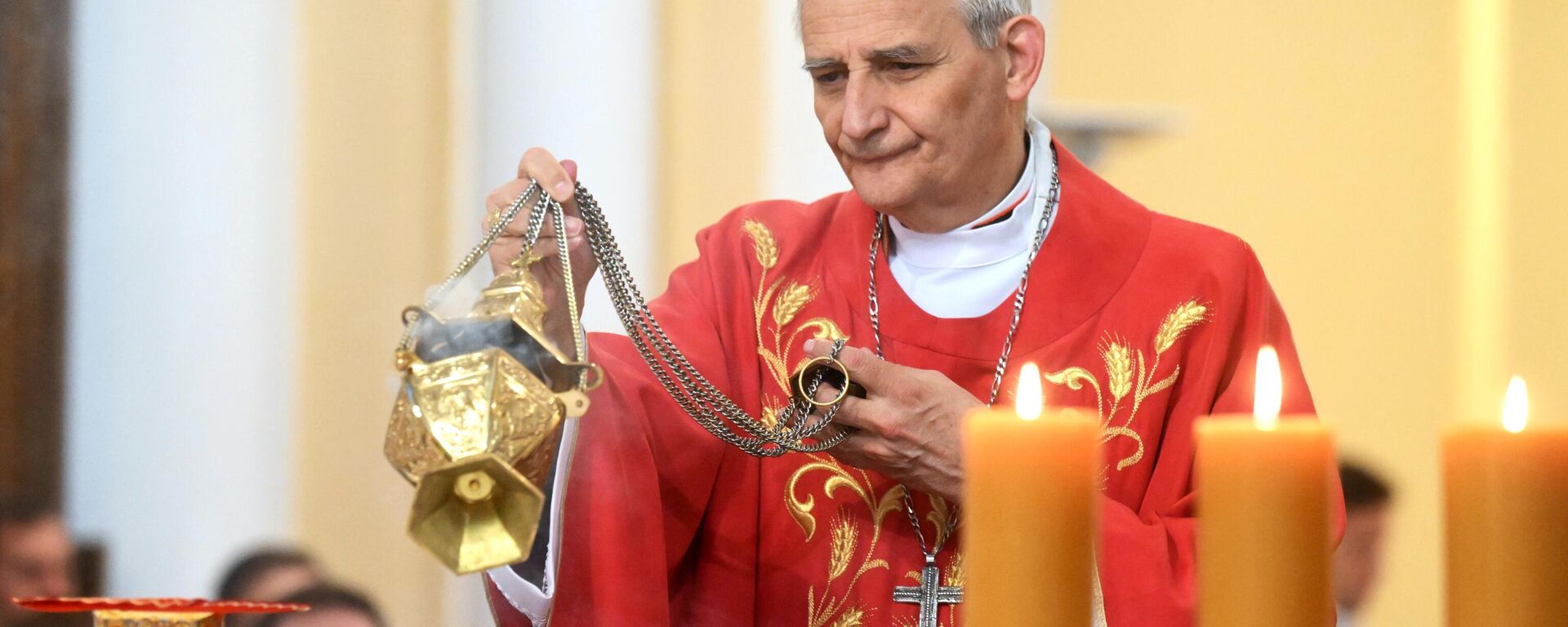https://sputnikglobe.com/20240311/eu-reacts-to-popes-peace-call-rudest-anti-catholic-critique-comes-from-poland-1117270048.html
EU Reacts to Pope’s Peace Call: Rudest Anti-Catholic Critique Comes From… Poland
EU Reacts to Pope’s Peace Call: Rudest Anti-Catholic Critique Comes From… Poland
Sputnik International
The recent call by the Roman Catholic Pope Francis II for peace negotiations between Russia and Ukraine under the “white flag” was met with reproach and insults from Western politicians — especially in Germany and Poland.
2024-03-11T17:25+0000
2024-03-11T17:25+0000
2024-03-11T19:25+0000
pope francis
world
europe
russia
ukraine
poland
european union (eu)
vatican
christianity
catholic church
https://cdn1.img.sputnikglobe.com/img/07e7/05/0d/1110329899_0:160:3072:1888_1920x0_80_0_0_d8767070882ce90ba3a771c74841ebb4.jpg
Pope Francis II has come under fire from staunchly-Catholic Poland for urging Ukraine to seek peace with Russia.The Pontiff made his comments in an interview with journalist Lorenzo Busccella for Swiss RSI TV, recorded in February — which was was only broadcast last week.Busccella asked the Argentine head of the Roman Catholic church for his view on calls for a peace talks between Kiev and Russia — which Ukrainian President Volodymyr Zelensky has banned by decree.“The word ‘to negotiate’ is a courageous word. When you see that you are being overwhelmed militarily, that the situation is developing in an unfavorable way for you, then you should have the courage to negotiate," Francis continued."You should not be ashamed of negotiating, because otherwise – how many more dead are you going to have? Negotiate and look for an intermediary," he added, naming Turkiye as one candidate.He stressed that Zelensky should "feel ashamed" if he failed to seek peace and "the situation gets worse!”In the interview, in Italian and aimed at Swiss Catholics, the Pope confirmed his readiness to step in as a mediator between the warring parties under the authority of the Holy See in Rome.Some of the strongest critique of the Pope's comments came from Ukrainian foreign minister Dmitry Kuleba, who the Pope had encouraged to make the first step towards peace.“Our flag is yellow and blue. Under this flag we live, die and win. We will never raise any other flags,” Kuleba said.He was echoed Latvian Foreign Minister Edgars Rinkevics, who wrote on his X page: “One does not capitulate to the evil, one fights against it and wins.”Kuleba also compared Francis’ words to the church's stance during Hitler’s rule in Germany, when Pope Pius XII kept silent about many Nazi crimes for fear of anti-Catholic repressions from the Third Reich.“We remember Vatican’s ‘white flag’ strategy in the first half of the twentieth century. I would insist on Vatican’s not repeating its past mistakes,” Kuleba said.German officials went further, dismissing the peace efforts of both the Catholic and Orthodox churches and insisting that Kiev fight on until “victory.”“As a Catholic woman, I am ashamed by the omissions and weaknesses [in the Pope’s statement]," liberal Free Democratic Party (FDP) defese spokeswoman Marie-Agnes Strack-Zimmermann told Tagesspiegel daily. “Why, in God’s name, isn’t Pope Francis criticizing the Russian Orthodox patriarch Kirill for inciting hatred against the Ukrainian people?”“This is a deceitful and slanderous statement from a German politician, which is unjust both to the Pope and to Patriarch Kirill and which shows how hostile the modern Western political elite is to Christianity,” Vakhtang Kipshidze, deputy head of the Russian Orthodox Church’s Synod Commission on Relations with Society and Media, told Sputnik. “The Russian Patriarch never incited any hatred against Ukrainians.""As for the Pope, I think his words should not be interpreted as an anti-Ukrainian statement," Kipshidze stressed. "It was a call for peace, which is unacceptable for Western politicians, because they insist on Ukraine’s victory at all costs.”Polish foreign minister Radoslaw Sikorski echoed Strack-Zimmerman’s comments, despite Poland’s reputation as a staunchly-Catholic nation. “How about, for balance, encouraging Putin to have the courage to withdraw his army from Ukraine? Peace would immediately ensue without the need for negotiations,” Sikorski wrote on X.Another leader of the ruling Civic Coalition, Grzegorz Schetyna, was even harsher. “The Pope is pro-Russian. His statement is evidence of his total ignorance on the subject of European politics,” Schetyna accused.“Let me remind you that just recently Western politicians and media accused our Patriarch Kirill of being belligerent simply because he did not call for Russia’s surrender and gave spiritual solace to Russia’s soldiers, who are often sacrificing their lives now," the Russian church official said."When Pope Francis called for a step towards peace from the side of Ukraine and the West, those same politicians and media outlets in the West lashed out against him — against the head of the Catholic church,” he underlined.In Kipshidze's opinion, Pope Francis’ peace proposal was neither a slip of tongue nor an unformed thought voiced aloud.“In my opinion, Pope Francis, who had been an Argentinian bishop before being elected Pope in 2013, represents the views of the Global South on the Ukrainian conflict,” Kipshidze said. “He wants negotiations and some kind of a peace of the brave, that would take into account the interests of all people living on Ukraine’s and Russia’s territories,” Kipshidze said.Kipshidze said it was clear that such a peace of the brave is unacceptable to the regime in Kiev and for its western sponsors, who want their Ukrainian proxies to win by any means.This is a very un-Christian approach, but typical for the modern EU, Kipshidze said. Even those parties in the EU which still have the word ‘Christian’ in their names stopped defending the Christian values of peace and family long ago, he added.
https://sputnikglobe.com/20240310/pope-francis-urges-zelensky-to-save-lives-find-courage-to-end-conflict-1117235173.html
https://sputnikglobe.com/20230630/papal-envoy-patriarch-kirill-discuss-humanitarian-steps-on-ukraine-settlement---holy-see-1111576764.html
russia
ukraine
poland
Sputnik International
feedback@sputniknews.com
+74956456601
MIA „Rosiya Segodnya“
2024
Dmitry Babich
https://cdn1.img.sputnikglobe.com/img/07e8/02/0e/1116778495_0:120:720:840_100x100_80_0_0_9bf47040bc46073fb920d272be7bc29d.jpg
Dmitry Babich
https://cdn1.img.sputnikglobe.com/img/07e8/02/0e/1116778495_0:120:720:840_100x100_80_0_0_9bf47040bc46073fb920d272be7bc29d.jpg
News
en_EN
Sputnik International
feedback@sputniknews.com
+74956456601
MIA „Rosiya Segodnya“
Sputnik International
feedback@sputniknews.com
+74956456601
MIA „Rosiya Segodnya“
Dmitry Babich
https://cdn1.img.sputnikglobe.com/img/07e8/02/0e/1116778495_0:120:720:840_100x100_80_0_0_9bf47040bc46073fb920d272be7bc29d.jpg
pope francis, catholic church, ukrainian crisis, ukrainian conflict, war in ukraine, ukraine-russia peace negotiations
pope francis, catholic church, ukrainian crisis, ukrainian conflict, war in ukraine, ukraine-russia peace negotiations
EU Reacts to Pope’s Peace Call: Rudest Anti-Catholic Critique Comes From… Poland
17:25 GMT 11.03.2024 (Updated: 19:25 GMT 11.03.2024) The recent call by the Roman Catholic Pope Francis II for peace negotiations between Russia and Ukraine under the “white flag” was met with reproach and insults from Western politicians — especially in Germany and Poland.
Pope Francis II has come under fire from staunchly-Catholic Poland for urging Ukraine to seek peace with Russia.
The Pontiff made his comments in an interview with journalist Lorenzo Busccella for Swiss RSI TV, recorded in February — which was was only broadcast last week.
Busccella asked the Argentine head of the Roman Catholic church for his view on calls for a peace talks between Kiev and Russia — which Ukrainian President Volodymyr Zelensky has banned by decree.
“This is the question of vision. I think that the strongest is the one that looks at the situation soberly," said the Pope. "The one that thinks about the plight of people and who has the courage to put out the white flag and to negotiate.”
“The word ‘to negotiate’ is a courageous word. When you see that you are being overwhelmed militarily, that the situation is developing in an unfavorable way for you, then you should have the courage to negotiate," Francis continued.
"You should not be ashamed of negotiating, because otherwise – how many more dead are you going to have? Negotiate and look for an intermediary," he added, naming Turkiye as one candidate.
He stressed that Zelensky should "feel ashamed" if he failed
to seek peace and "the situation gets worse!”
In the interview, in Italian and aimed at Swiss Catholics, the Pope confirmed his readiness to step in as a mediator between the warring parties under the authority of the Holy See in Rome.
Some of the strongest critique of the Pope's comments came from Ukrainian foreign minister Dmitry Kuleba, who the Pope had encouraged to make the first step towards peace.
“Our flag is yellow and blue. Under this flag we live, die and win. We will never raise any other flags,” Kuleba said.
He was echoed Latvian Foreign Minister Edgars Rinkevics, who wrote on his X page: “One does not capitulate to the evil, one fights against it and wins.”
Kuleba also compared Francis’ words to the church's stance during Hitler’s rule in Germany, when Pope Pius XII kept silent about many Nazi crimes for fear of anti-Catholic repressions from the Third Reich.
“We remember Vatican’s ‘white flag’ strategy in the first half of the twentieth century. I would insist on Vatican’s not repeating its past mistakes,” Kuleba said.
German officials went further, dismissing the peace efforts of both the Catholic and Orthodox churches and insisting that Kiev fight on until “victory.”
“As a Catholic woman, I am ashamed by the omissions and weaknesses [in the Pope’s statement]," liberal Free Democratic Party (FDP) defese spokeswoman Marie-Agnes Strack-Zimmermann told Tagesspiegel daily. “Why, in God’s name, isn’t Pope Francis criticizing the Russian Orthodox patriarch Kirill for inciting hatred against the Ukrainian people?”
“This is a deceitful and slanderous statement from a German politician, which is unjust both to the Pope and to Patriarch Kirill and which shows how hostile the modern Western political elite is to Christianity,” Vakhtang Kipshidze, deputy head of the Russian Orthodox Church’s Synod Commission on Relations with Society and Media, told Sputnik. “The Russian Patriarch never incited any hatred against Ukrainians."
"As for the Pope, I think his words should not be interpreted as an anti-Ukrainian statement," Kipshidze stressed. "It was a call for peace, which is unacceptable for Western politicians, because they insist on Ukraine’s victory at all costs.”
Polish foreign minister Radoslaw Sikorski echoed Strack-Zimmerman’s comments, despite Poland’s reputation as a staunchly-Catholic nation.
“How about, for balance, encouraging Putin to have the courage to withdraw his army from Ukraine? Peace would immediately ensue without the need for negotiations,” Sikorski wrote on X.
Another leader of the ruling Civic Coalition, Grzegorz Schetyna, was even harsher.
“The Pope is pro-Russian. His statement is evidence of his total ignorance on the subject of European politics,” Schetyna accused.
“I think this is a typical approach of Western politicians now," Kipshidze said. "They dismiss the opinions of religious leaders without any respect, if these leaders’ position does not suit the Western agenda.”
“Let me remind you that just recently Western politicians and media accused our Patriarch Kirill of being belligerent simply because he did not call for Russia’s surrender and gave spiritual solace to Russia’s soldiers, who are often sacrificing their lives now," the Russian church official said.
"When Pope Francis called for a step towards peace from the side of Ukraine and the West, those same politicians and media outlets in the West lashed out against him — against the head of the Catholic church,” he underlined.
In Kipshidze's opinion, Pope Francis’ peace proposal was neither a slip of tongue nor an unformed thought voiced aloud.
“In my opinion, Pope Francis, who had been an Argentinian bishop before being elected Pope in 2013, represents the views of the
Global South on the Ukrainian conflict,” Kipshidze said. “He wants negotiations and some kind of a peace of the brave, that would take into account the interests of all people living on Ukraine’s and Russia’s territories,” Kipshidze said.
Kipshidze said it was clear that such a peace of the brave is unacceptable to the regime in Kiev and for its western sponsors, who want their Ukrainian proxies to win by any means.
This is a very un-Christian approach, but typical for the modern EU, Kipshidze said. Even those parties in the EU which still have the word ‘Christian’ in their names stopped defending the Christian values of peace and family long ago, he added.







